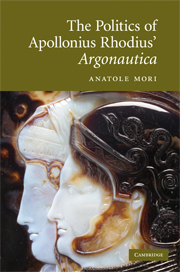Book contents
- Frontmatter
- Contents
- List of tables
- Acknowledgments
- List of abbreviations
- 1 Introduction
- 2 The politics of Alexandrian poetry
- 3 Strife and restraint among the Argonauts
- 4 Sexual politics in Lemnos, Colchis, and Drepane
- 5 Piety, mediation, and the favor of the gods
- 6 The bones of Apsyrtus
- 7 Quid denique restat: Apollonius and Virgil
- Bibliography
- Index
3 - Strife and restraint among the Argonauts
Published online by Cambridge University Press: 22 September 2009
- Frontmatter
- Contents
- List of tables
- Acknowledgments
- List of abbreviations
- 1 Introduction
- 2 The politics of Alexandrian poetry
- 3 Strife and restraint among the Argonauts
- 4 Sexual politics in Lemnos, Colchis, and Drepane
- 5 Piety, mediation, and the favor of the gods
- 6 The bones of Apsyrtus
- 7 Quid denique restat: Apollonius and Virgil
- Bibliography
- Index
Summary
Epic modalities: Eros and eris
Alexander's notorious differences with his army eventually brought the Macedonian conquest of the east to an end. These protracted tensions offer a useful counterpoint to the Argonauts’ various conflicts with Jason, which range from mild criticism to something like mutiny. Sexual desire (eros) is linked with strife (eris) in the poem, contributing greatly to the religious crisis that jeopardizes the Argonauts’ journey home, but on the whole the Argonauts’ difficulties are quickly resolved and never disrupt their progress. This chapter explores the political organization and social interactions of the Argonauts, with a particular emphasis on their recovery from factional strife. Historical events or practices, where relevant, afford points of comparison with three episodes: Jason's election (1.317–62), the quarrel between Idas and Idmon (1.460–94), and Telamon's rebellion (1.1286–344). The last episode demonstrates the importance of emotional control aboard the Argo, presenting both a divine justification and a philosophical foundation for the reconciliation between Telamon and Jason. While each episode illustrates a different kind of political tension, all three strengthen the impression that the Argonauts’ dominant social register is concord, not strife (eris). In particular, it is Jason's behavior – his even temper, self-control, and forgiveness of insults – that revises not only the vengeful extremes of historical figures like Alexander and Cleitus the Black but also heroic characters like Agamemnon and Achilles.
Generally speaking the Argonauts govern themselves by means of group deliberation.
- Type
- Chapter
- Information
- The Politics of Apollonius Rhodius' Argonautica , pp. 52 - 90Publisher: Cambridge University PressPrint publication year: 2008
- 1
- Cited by



